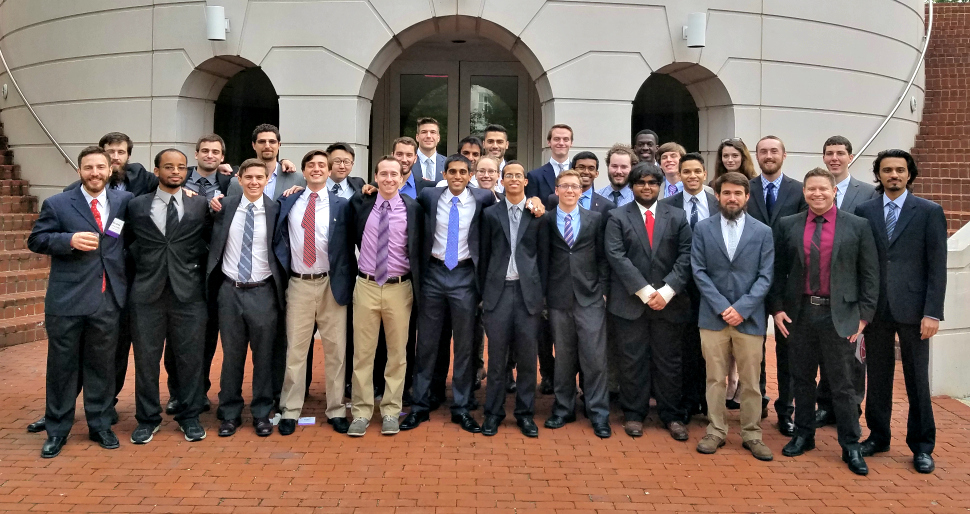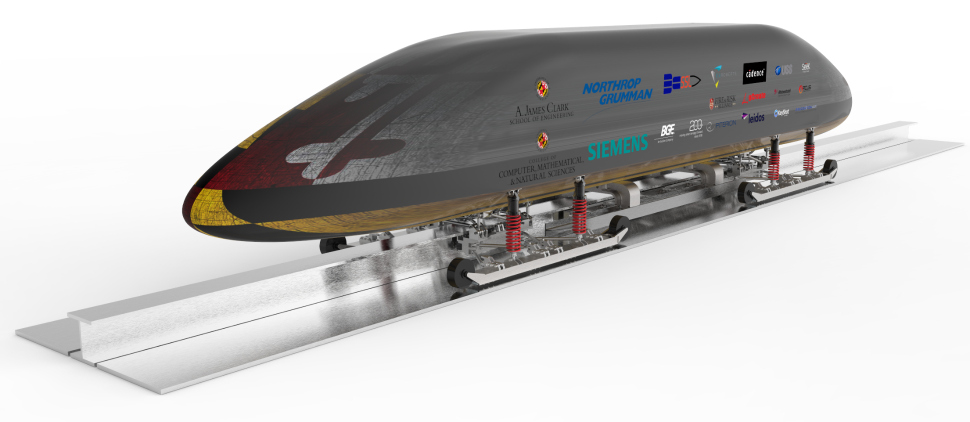Scott Smith, November 23, 2016
SpaceX?s Hyperloop project may be at least a decade away from becoming a reality, but a group of undergraduates at Maryland is already hard at work to make it happen.
In January 2017, the UMD Loop team, captained by 21-year-old junior Kyle Kaplan, will compete in a competition weekend, the next phase of its Hyperloop Pod Competition for university students and independent engineers. The goal will be to create a working Hyperloop pod that operates at the highest possible speed on a test track at SpaceX?s Hawthorne, California headquarters. All in an effort to create prototypes for a system that would allow for high-speed travel between cities too far for a quick car ride, but too close to make plane travel worth the bother of arriving two hours early to the airport.
The UMD Loop team is composed of sixty people, almost entirely undergrads, working on mechanical and electronic systems, budgets, sponsorship and day-to-day logistics. The team?s pod, which will begin final assembly and testing soon, involves magnetic systems for levitation within the tube – key to maintaining high speeds without friction – and well as for control and braking.
BTN LiveBIG spoke with Kaplan about the team?s work on the project and how Maryland made it all possible.
BTN LiveBIG: How did the team form?
Kyle Kaplan: My good friend from high school – who actually went to Rutgers – he approached me and said ?Have you seen this competition? It?s this really cool idea. We should totally enter a team.? At the time, I wasn?t doing too much and I just thought ?Yeah that sounds like a great idea.? I love SpaceX and what they?re doing. It?s kind of a no-brainer. We grabbed all of our people that we knew were smart and built the team around us.
BTN LiveBIG: What draws you to this project?
Kaplan: I love to compete. I?m a very competitive person. I?ve played sports my whole life. That?s part of it. I think the other big part of it is just the passion I have for engineering. We didn?t go into this [thinking] ?This is how you build a Hyperloop pod.? It was just, like, ?let?s try and tackle the problem how we know we can.? That kind of stuff – solving problems and doing very large-scale decision making and trying to figure out the best way to do something? I love that kind of thing. It?s exciting.
BTN LiveBIG: Have any of you done something like this in the past?
Kaplan: Not many of us walked into this with a ton of experience. Some of it came from class projects and personal projects.I didn?t really have all the experience, a lot of it came on the job, actually working through the project.

BTN LiveBIG: Is there one primary problem you?re trying to solve?
Kaplan: We?ve got a ton of magnetic systems on board the pod. The big problem with that is they only work with speed because they?re passive, they?re not electronically controlled. So we run into this issue where in order to test your magnets you need things moving at very high speeds. And not just things, but metal. You want to move something that is very, very dangerous, very very fast and get meaningful data out of it. We?ve succeeded in doing that, to a point, but it?s a very difficult challenge to solve.
BTN LiveBIG: If you succeed in January, what happens next?
Kaplan: We are working on [Hyperloop Pod] Competition II, which is next summer so we?d probably continue to work on that pod and make improvements based on what we learned at Competition I and keep iterating our concept and making it better.
BTN LiveBIG: If you?re successful, how far away is the Hyperloop concept from becoming a reality?
Kaplan: What we?re doing is half-scale. It?s not full-scale. You couldn?t put a person in our pod and expect them to be safe in vacuum conditions. There?s a lot that still needs to get worked out, a lot of engineering to be done, especially on the human side of it. That puts it at least a decade away if you want to make this the next plane.
BTN LiveBIG: Is this something you see yourself devoting the rest of your life to?
Kaplan: Um, probably not? (laughs) It?s something I find really interesting and I want to see happen because I think it has the possibility to change the world in a lot of ways. But my fascination is more with space. I see myself going more into rocketry. But if I had the opportunity to work on Hyperloop, I might take it.
BTN LiveBIG: How did being at Maryland prepare you for this?
Kaplan: Maryland?s been fantastic through the whole process. They supported us going to Design Weekend. They supported us again when we got back, made sure we got funding. They taught me the basics of how to become an engineer. That?s really where Maryland fits into this: it?s allowing it to be possible and giving us the tools we need and then it?s up to us to make it happen. I like that about Maryland. It?s kinda hands-off but we?ll make sure that you?re covered.







 See what's coming up live on B1G+ every day of the season at BigTenPlus.com.
See what's coming up live on B1G+ every day of the season at BigTenPlus.com. 